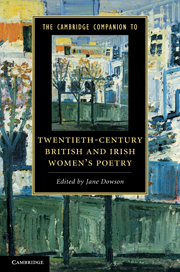Book contents
- Frontmatter
- 1 Introduction
- 2 Post/Modernist rhythms and voices: Edith Sitwell and Stevie Smith to Jo Shapcott and Selima Hill
- 3 Reframing women’s war poetry
- 4 Verbal and visual art in twentieth-century British women’s poetry
- 5 Towards a new confessionalism
- 6 The mid-Atlantic imagination: Mina Loy, Ruth Fainlight, Anne Stevenson, Anne Rouse and Eva Salzman
- 7 The Irish history wars and Irish women’s poetry: Eiléan Ní Chuilleanáin and Eavan Boland
- 8 Interculturalism: Imtiaz Dharker, Patience Agbabi, Jackie Kay and contemporary Irish poets
- 9 Post-pastoral perspectives on landscape and culture
- 10 Feminism’s experimental ‘work at the language-face’
- 11 Carol Ann Duffy, Medbh McGuckian and ruptures in the lines of communication
- Selected reading
- Index
6 - The mid-Atlantic imagination: Mina Loy, Ruth Fainlight, Anne Stevenson, Anne Rouse and Eva Salzman
Published online by Cambridge University Press: 28 May 2011
- Frontmatter
- 1 Introduction
- 2 Post/Modernist rhythms and voices: Edith Sitwell and Stevie Smith to Jo Shapcott and Selima Hill
- 3 Reframing women’s war poetry
- 4 Verbal and visual art in twentieth-century British women’s poetry
- 5 Towards a new confessionalism
- 6 The mid-Atlantic imagination: Mina Loy, Ruth Fainlight, Anne Stevenson, Anne Rouse and Eva Salzman
- 7 The Irish history wars and Irish women’s poetry: Eiléan Ní Chuilleanáin and Eavan Boland
- 8 Interculturalism: Imtiaz Dharker, Patience Agbabi, Jackie Kay and contemporary Irish poets
- 9 Post-pastoral perspectives on landscape and culture
- 10 Feminism’s experimental ‘work at the language-face’
- 11 Carol Ann Duffy, Medbh McGuckian and ruptures in the lines of communication
- Selected reading
- Index
Summary
Maybe one of the hallmarks in my work is a mid-Atlantic suspension. Or Nowheresville.
This chapter aims to give a place to poets who can qualify as both American and British but often get claimed by one side of the divide or fall in between. These poets include British-born Mina Loy (1882–1966) and American-born Ruth Fainlight (1931–), Anne Stevenson (1933–), Anne Rouse (1954–) and Eva Salzman (1961–). Collectively, their publications span nearly the entire century: Loy’s output covers the early twentieth century (although she produced work right up until the 1960s); Fainlight and Stevenson – Plath’s contemporaries – are post-war poets still publishing today; Rouse and Salzman are late twentieth-century poets whose careers began in the last decade with the arrival of Salzman’s The English Earthquake in 1992 and Rouse’s Sunset Grill a year later. The need to define these poets as a national product often leads to the stamping out of their cultural duality. Loy is mostly regarded as American, despite her orthodox upbringing in Victorian England. Stevenson and Fainlight are usually perceived as British, even though they spent their formative years in America. Rouse and Salzman, having both established themselves in Britain for many years, are only ever seen as American. A term that fully captures their affiliation with two cultures is needed. Despite ‘Anglo- American’ literally meaning a British-born American, it comes closest to reflecting their sense of ‘bothness’.
- Type
- Chapter
- Information
- Publisher: Cambridge University PressPrint publication year: 2011
- 1
- Cited by



